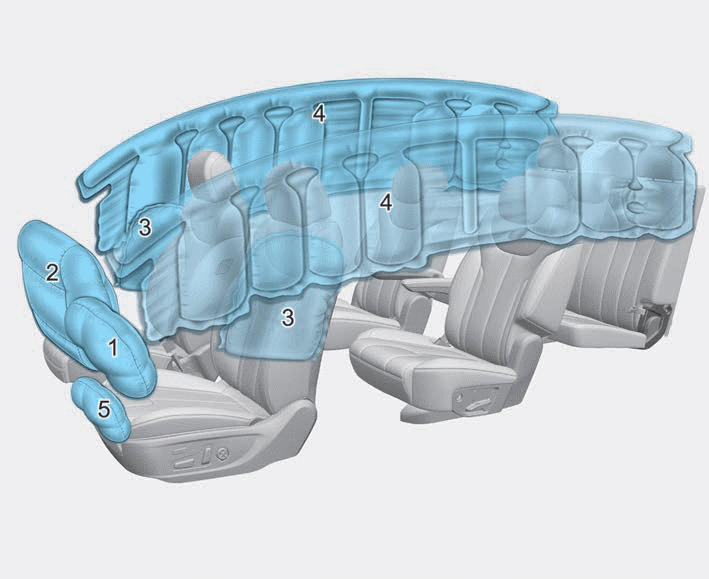Hyundai Palisade: Automatic Transaxle System / Automatic Transaxle
Hyundai Palisade (LX2) 2020-2025 Service Manual / Automatic Transaxle System (A8LF1) / Automatic Transaxle System / Automatic Transaxle
Repair procedures
| Removal |
|
| 1. |
Turn ignition switch OFF and disconnect the negative (-) battery cable.
|
| 2. |
Remove the air duct and the air cleaner assembly.
(Refer to Engine Mechanical System - "Air Cleaner")
|
| 3. |
Remove the battery and battery tray.
(Refer to Engine Electrical System - "Battery")
|
| 4. |
Disconnect the main connector (A), electronic shift actuator connector
(B) and position sensor connector (C).
|
| 5. |
Remove the bolt (A) and then separate the wiring (B).
|
| 6. |
Loosen the bolt (A) and then separate the wiring (B).
|
| 7. |
Remove the ground line (A).
|
| 8. |
Separate the ATF cooler hose (A).
|
| 9. |
Remove the CKP sensor (A) after loosening the bolt.
|
| 10. |
Remove the transaxle upper mounting bolts (A, B).
|
| 11. |
Assemble the engine support fixture use a (Beam SST No..: 09200 - 3N000,
Supporter SST No..: 09200-2S000, Adaptor SST No..: 09200-2W000).
|
| 12. |
Using the engine support fixture, hold the engine and transaxle assembly
safely.
|
| 13. |
Remove the cover (A).
|
| 14. |
Remove the transaxle mounting bracket bolts (A).
|
| 15. |
Loosen the transaxle support bracket mounting bolts and then removing
the transaxle support bracket (A).
|
| 16. |
Remove the under cover.
(Refer to Engine Mechanical System - "Engine Room Under Cover")
|
| 17. |
Remove the sub frame.
(Refer to Suspension System - "Sub Frame")
|
| 18. |
Remove the driveshaft assembly.
(Refer to Driveshaft and Axle - "Front Driveshaft")
|
| 19. |
In case of 4WD vehicle, remove the transfer assembly.
(Refer to 4 Wheel Drive System-"Transfer Assembly")
|
| 20. |
Disconnect the EOP(Electronic Oil Pump) connector (A).
|
| 21. |
Remove the dust cover (A).
|
| 22. |
Remove the torque converter mounting bolts (A) by rotating the crankshaft.
|
| 23. |
Remove the roll rod support bracket (A).
|
| 24. |
Support the transaxle safely with a jack.
|
| 25. |
Remove the starter mounting bolts (A).
|
| 26. |
Loosen the transaxle lower mounting bolts (A, B).
|
| 27. |
After separating the transaxle from the engine, remove the transaxle
by lowering the jack slowly.
|
| Installation |
| 1. |
To install, reverse the removal procedure.
|
| 2. |
In case of the reinstallation.
|
| 3. |
In case of the replacing with a new automatic transaxle.
|
 Automatic Transaxle Fluid (ATF)
Automatic Transaxle Fluid (ATF)
Components and components location
Components Location
1. ATF Injection plug (Eyebolt)
2. ATF injection plug gasket
3...
Other information:
Hyundai Palisade (LX2) 2020-2025 Service Manual: Center Fascia Panel
Components and components location Component Location 1. Front center fascia panel 2. Rear center fascia panel Repair procedures Replacement [Front center facsia panel] • When removing with a flat-tip screwdriver or remover, wrap protective tape around the tools to prevent damage to components...
Hyundai Palisade (LX2) 2020-2025 Service Manual: Front Wheel Speed Sensor
Components and components location Components 1. Front wheel speed sensor 2. Front wheel speed sensor connector Repair procedures Removal • Be careful not to damage the parts located under the vehicle (floor under cover, fuel filter, fuel tank and canister) when raising the vehicle using the lift...
Categories
- Manuals Home
- 1st Generation Palisade Owners Manual
- 1st Generation Palisade Service Manual
- Auto Hold
- Wireless Cellular Phone Charging System
- Electrochromatic Mirror (ECM) with homelink system
- New on site
- Most important about car
Air Bag - Advanced Supplemental Restraint System

1. Driver's front air bag
2. Passenger's front air bag
3. Side air bag
4. Curtain air bag
5. Driver’s knee airbag
This vehicle is equipped with an Advanced Supplemental Air Bag System for the driver's seat and front passenger's seats.
Copyright © 2025 www.hpalisadelx.com



































